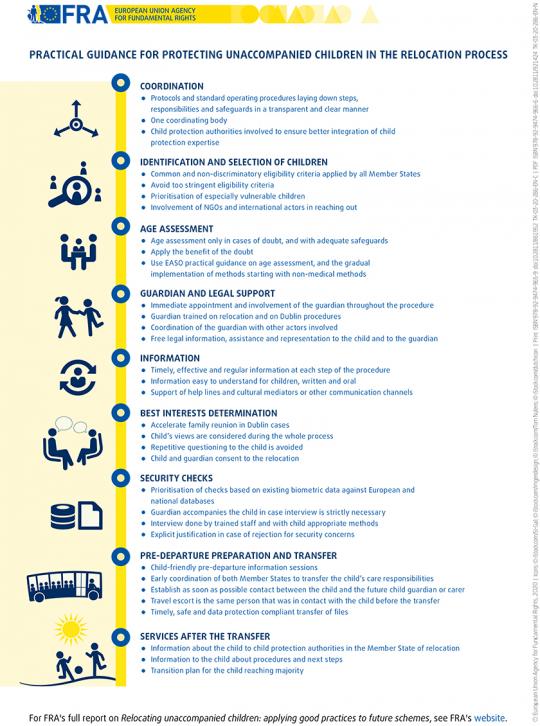Download the full guide on Relocating unaccompanied children: applying good practices to future schemes >>
Coordination
- Protocols and standard operating procedures laying down steps, responsibilities and safeguards in a transparent and clear manner
- One coordinating body
- Child protection authorities involved to ensure better integration of child protection expertise
Age assessment
- Age assessment only in cases of doubt, and with adequate safeguards
- Apply the benefit of the doubt
- Use EASO practical guidance on age assessment, and the gradual implementation of methods starting with non-medical methods
Idenitfication and selection of children
- Common and non-discriminatory eligibility criteria applied by all Member States
- Avoid too stringent eligibility criteria
- Prioritisation of especially vulnerable children
- Involvement of NGOs and international actors in reaching out
Guardian and legal support
- Immediate appointment and involvement of the guardian throughout the procedure
- Guardian trained on relocation and on Dublin procedures
- Coordination of the guardian with other actors involved
- Free legal information, assistance and representation to the child and to the guardian
Information
- Timely, effective and regular information at each step of the procedure
- Information easy to understand for children, written and oral
- Support of help lines and cultural mediators or other communication channels
Best interests determination
- Accelerate family reunion in Dublin cases
- Child’s views are considered during the whole process
- Repetitive questioning to the child is avoided
- Child and guardian consent to the relocation
Security checks
- Prioritisation of checks based on existing biometric data against European and national databases
- Guardian accompanies the child in case interview is strictly necessary
- Interview done by trained staff and with child appropriate methods
- Explicit justification in case of rejection for security concerns
Pre-departure preparation and transfer
- Child-friendly pre-departure information sessions
- Early coordination of both Member States to transfer the child’s care responsibilities
- Establish as soon as possible contact between the child and the future child guardian or carer
- Travel escort is the same person that was in contact with the child before the transfer
- Timely, safe and data protection compliant transfer of files
Services after transfer
- Information about the child to child protection authorities in the Member State of relocation
- Information to the child about procedures and next
- Transition plan for the child reaching majority


